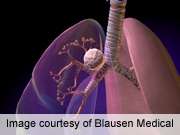Changes in size on sequential low-dose computed tomography screenings, expressed as volume doubling time, indicate that about 25 percent of progressive lung cancers are slow growing or indolent, with higher lung cancer-specific mortality for new versus slow-growing or indolent cancers, according to a study published in the Dec. 4 issue of the Annals of Internal Medicine.
(HealthDay)—Changes in size on sequential low-dose computed tomography (LDCT) screenings, expressed as volume doubling time (VDT), indicate that about 25 percent of progressive lung cancers are slow growing or indolent, with higher lung cancer-specific mortality for new versus slow-growing or indolent cancers, according to a study published in the Dec. 4 issue of the Annals of Internal Medicine.
Giulia Veronesi, M.D., from the European Institute of Oncology in Milan, and colleagues assessed VDT as an indicator of overdiagnosis for screening-detected lung cancer by estimating the VDT in 175 high-risk patients who were diagnosed with primary lung cancer. VDT was characterized as fast growing (VDT <400 days), slow growing (VDT between 400 and 599 days), or indolent (VDT ≥600 days).
Within the cohort, 55 cases of cancer were diagnosed at baseline and 120 were diagnosed subsequently. Of the later group, the researchers found that 15.8 percent of tumors were not visible on previous scans and were classified as fast growing (median VDT 52 days); 84.2 percent were progressive (58.3 percent fast growing and 25.8 percent slow growing [15.0 percent] or indolent [10.8 percent]). For patients with new versus slow-growing or indolent cancer, lung cancer-specific mortality was significantly higher (9.2 versus 0.9 percent per year). Of the incident cancers, 60 percent of fast-growing progressive cancer and 45 percent of new cancers were stage 1.
"Slow-growing or indolent cancer comprised approximately 25 percent of incident cases, many of which may have been overdiagnosed," the authors write. "To limit overtreatment in these cases, minimally invasive limited resection and nonsurgical treatments should be investigated."
More information: Full Text (subscription or payment may be required)
Journal information: Annals of Internal Medicine
Copyright © 2012 HealthDay. All rights reserved.



















